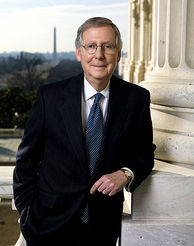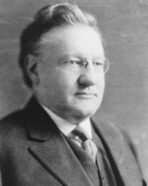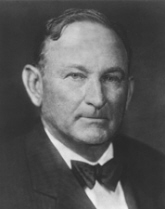Mitch McConnell: Not So Easy Target?
Only one of 14 U.S. Senate Minority Leaders in history have been defeated at the ballot box while no Senate party floor leader has ever lost when his party has netted seats in the chamber

Republican Minority Leader Mitch McConnell remains locked in a fierce battle with likely Democratic nominee, Kentucky Secretary of State Alison Lundergan Grimes, while keeping an eye on his chief rival in the GOP primary, businessman Matt Bevin.
In what has become a familiar scene for Republicans in recent years, a prominent incumbent once again risks being pulled to the right due to a primary challenger – with unclear consequences for the general election.
Add to that McConnell’s own challenge of being the face of his party in the chamber.
As bipartisan cooperation in Congress has waned in recent years, Senate floor leaders have not only become unpopular political figures nationwide, but have also faced competitive reelection bids back in their home states.
In fact, the current stretch of three consecutive races decided by single digits involving party floor leaders since 2004 is the longest since such leadership positions were created by the parties in the U.S. Senate during the 1920s.
To date, Democrat Tom Daschle remains the lone sitting Minority Leader in the chamber to go down to defeat – losing by 1.2 points to John Thune in 2004.
Overall, sitting Senate minority leaders have won 13 of 14 reelection bids, including McConnell’s 5.9-point victory over Bruce Lunsford in 2008 – the fifth narrowest victory by a majority or minority leader during the past 90+ years. (Harry Reid’s 5.7-point win over Sharron Angle in 2010 comes in at #3).
Daschle’s loss and the close calls experienced by McConnell and Reid stand in stark contrast to the ease with which party floor leaders have generally cruised to reelection over the decades.
Overall, sitting U.S. Senate party floor leaders have won 87 percent of their reelection bids – 26 wins versus just 4 losses.
Majority and minority party leaders have averaged 61.4 percent of the vote during these reelection bids with the 26 winners notching an average margin of victory of 29 points.
Since 1920, there have been 11 Democratic and 16 Republican floor leaders in the U.S. Senate.
(Note: The data in this analysis includes Massachusetts Republican Henry Cabot Lodge, who was the GOP’s party conference chairman and served as an unofficial party leader when the Democrats elected their first leader, Oscar Underwood in 1920).

Indiana Republican and Majority Leader James Watson was the first – losing to Democrat Frederick Van Nuys by 13.6 points during the Democratic landslide of 1932.
Democratic Majority Leaders Scott Lucas of Illinois and Ernest McFarland of Arizona were defeated in back-to-back election cycles in 1950 and 1952 respectively.
Lucas lost by 8.1 points to future GOP Minority Leader Everett Dirksen in 1950 while McFarland was narrowly defeated by 2.6 points by future Republican presidential nominee Barry Goldwater two years later.
Fifty-two years would pass before another Senate floor leader would be toppled at the polls – South Dakota’s Daschle, who lost by 4,508 votes to John Thune in 2004.
A loss by McConnell to Lundergan Grimes in 2014 would also be particularly noteworthy because the Republican Party is expected to gain seats (if not take back the chamber) next November.
In the four instances mentioned above in which floor leaders were defeated, their party lost net seats in the chamber that cycle:
· In 1932 (Watson): Republicans lost a net 12 seats as Democrats took back control of the chamber
· In 1950 (Lucas): Democrats shed a net five seats
· In 1952 (McFarland): Democrats lost a net two seats as the GOP took back control of the chamber
· In 2004 (Daschle): Democrats lost a net four seats

Of the 25 former majority and minority leaders, nearly one-quarter (six) died while still holding their post: Democrat Joseph Robinson of Arkansas (in 1937) and Republicans Henry Cabot Lodge of Massachusetts (1924), Charles McNary of Oregon (1944), Kenneth Wherry of Nebraska (1951), Robert Taft of Ohio (1953), and Everett Dirksen of Illinois (1969).
An additional 11 leaders either did not seek another term or resigned from the U.S. Senate mid-term, including four who became presidential or vice-presidential nominees: Republicans Charles Curtis of Kansas (to become vice-president under Herbert Hoover), Wallace White, Jr. of Maine, William Knowland of California, Hugh Scott of Pennsylvania, Howard Baker of Tennessee, and Bob Dole of Kansas (to run for President), and Democrats Alben Barkley of Kentucky (to become vice-president under Harry Truman), Lyndon Johnson of Texas (to become vice-president under John Kennedy), Mike Mansfield of Montana, and George Mitchell of Maine.
Another four party floor leaders stepped down from their position, without immediately retiring from the Senate: Democrat Oscar Underwood of Alabama (due to illness), Republican Styles Bridges of New Hampshire (to become Appropriations Committee chair and president pro tempore), Democrat Robert Byrd of West Virginia (to become Appropriations Committee chair and president pro tempore), and Republican Trent Lott of Mississippi (under pressure from his caucus).
Despite the long record of success of party floor leaders winning reelection, few have been given a free pass.
Only once has a floor leader run unchallenged in the general election: Democratic Minority Leader Joseph Robinson of Arkansas in 1930.
(Since 1920, a total of 124 U.S. Senate races have had only one major party candidate on the ballot).
As for the idea that McConnell might be in for a fight in his primary battle with Matt Bevin, those odds should be long.
In fact, no party floor leader has lost a renomination bid across the 30 such attempts since 1920.
Moreover, since 1960 no floor leader has received less than 75 percent of the vote in a primary election – with more than a third receiving no primary challenge.
Harry Reid’s 75.3 percent as majority leader in 2010 ranks as the lowest mark during this span with Democratic Majority Leader Mike Mansfield of Montana next at 77.2 percent in 1970.
Campaign-watchers are eagerly awaiting the final fundraising numbers for McConnell and Lundergan Grimes for the fourth quarter of 2013 due by mid-month.
Electoral Fate of U.S. Senate Majority and Minority Leaders, 1920-Present
|
Year
|
State
|
Party leader
|
Leader
|
Party |
Result
|
%
|
MoV
|
|
1920
|
AL
|
Oscar Underwood
|
Minority
|
DEM
|
Won
|
66.1
|
33.0
|
|
1922
|
MA
|
Henry Cabot Lodge
|
Majority
|
REP
|
Won
|
47.6
|
0.9
|
|
1924
|
AR
|
Joseph Robinson
|
Minority
|
DEM
|
Won
|
73.5
|
47.0
|
|
1926
|
KS
|
Charles Curtis
|
Majority
|
REP
|
Won
|
63.6
|
28.9
|
|
1930
|
AR
|
Joseph Robinson
|
Minority
|
DEM
|
Won
|
100.0
|
100.0
|
|
1932
|
IN
|
James Watson
|
Majority
|
REP
|
Lost
|
43.2
|
-13.6
|
|
1936
|
AR
|
Joseph Robinson
|
Majority
|
DEM
|
Won
|
84.1
|
69.0
|
|
1936
|
OR
|
Charles McNary
|
Minority
|
REP
|
Won
|
49.7
|
1.4
|
|
1938
|
KY
|
Alben Barkley
|
Majority
|
DEM
|
Won
|
62.0
|
24.0
|
|
1942
|
OR
|
Charles McNary
|
Minority
|
REP
|
Won
|
77.1
|
54.2
|
|
1944
|
KY
|
Alben Barkley
|
Majority
|
DEM
|
Won
|
54.8
|
9.9
|
|
1950
|
IL
|
Scott Lucas
|
Majority
|
DEM
|
Lost
|
45.8
|
-8.1
|
|
1952
|
AZ
|
Ernest McFarland
|
Majority
|
DEM
|
Lost
|
48.7
|
-2.6
|
|
1954
|
TX
|
Lyndon Johnson
|
Majority
|
DEM
|
Won
|
84.6
|
69.7
|
|
1960
|
TX
|
Lyndon Johnson
|
Majority
|
DEM
|
Won
|
58.0
|
16.9
|
|
1962
|
IL
|
Everett Dirksen
|
Minority
|
REP
|
Won
|
52.9
|
5.8
|
|
1964
|
MT
|
Mike Mansfield
|
Majority
|
DEM
|
Won
|
64.5
|
29.0
|
|
1968
|
IL
|
Everett Dirksen
|
Minority
|
REP
|
Won
|
53.0
|
6.4
|
|
1970
|
MT
|
Mike Mansfield
|
Majority
|
DEM
|
Won
|
60.5
|
21.0
|
|
1970
|
PA
|
Hugh Scott
|
Minority
|
REP
|
Won
|
51.4
|
6.0
|
|
1978
|
TN
|
Howard Baker
|
Minority
|
REP
|
Won
|
55.5
|
15.2
|
|
1982
|
WV
|
Robert Byrd
|
Minority
|
DEM
|
Won
|
68.5
|
37.7
|
|
1986
|
KS
|
Bob Dole
|
Majority
|
REP
|
Won
|
70.0
|
40.0
|
|
1988
|
WV
|
Robert Byrd
|
Majority
|
DEM
|
Won
|
64.8
|
29.6
|
|
1992
|
KS
|
Bob Dole
|
Minority
|
REP
|
Won
|
62.7
|
31.7
|
|
1998
|
SD
|
Tom Daschle
|
Minority
|
DEM
|
Won
|
62.1
|
25.7
|
|
2000
|
MS
|
Trent Lott
|
Majority
|
REP
|
Won
|
65.9
|
34.3
|
|
2004
|
SD
|
Tom Daschle
|
Minority
|
DEM
|
Lost
|
49.4
|
-1.2
|
|
2008
|
KY
|
Mitch McConnell
|
Minority
|
REP
|
Won
|
53.0
|
5.9
|
|
2010
|
NV
|
Harry Reid
|
Majority
|
DEM
|
Won
|
50.3
|
5.7
|
Note: Seven U.S. Senators never went up for reelection while holding their party floor leader title: Republicans Wallace White (ME), Kenneth Wherry (NE), Styles Bridges (NH), Robert Taft (OH), William Knowland (CA), and Bill Frist (TN) and Democrat George Mitchell (ME). Election data compiled from the Office of the Clerk of the U.S. House of Representatives by Smart Politics.
Follow Smart Politics on Twitter.
